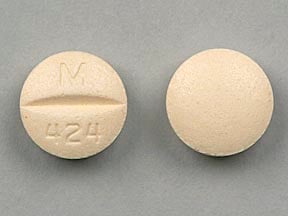
Metoprolol-hydrochlorothiazide Coupons & Savings Card – Discount Prices from $42.13
Metoprolol/hydrochlorothiazide is a combination medication used to manage high blood pressure in adults. By lowering blood pressure, it helps reduce the risk of strokes, heart attacks, and kidney issues. This medication combines two active ingredients: metoprolol, a beta blocker, and hydrochlorothiazide, a diuretic. Metoprolol works by blocking certain natural chemicals, such as epinephrine, from affecting the heart and blood vessels, which results in a reduced heart rate, lower blood pressure, and decreased heart strain. Hydrochlorothiazide aids in eliminating excess salt and water from the body, which may initially increase urine production. This medication is typically taken by mouth once or twice a day with food. Common side effects can include dizziness and tiredness. The brand name Lopressor HCT is no longer available. Always consult with a healthcare professional before starting any new medication to ensure it is appropriate for your condition.
Our coupons are free to use. Before paying, show the pharmacist your Metoprolol-hydrochlorothiazide savings card to get your free discount. Use our filters below to edit the prescription box to match your needs. The Metoprolol-hydrochlorothiazide prices will update based on your prescription needs. Above our Metoprolol-hydrochlorothiazide coupons, you can change your location to see pharmacy prices and costs in other areas. We're here to help you buy Metoprolol-hydrochlorothiazide at the lowest price with our prescription discount card.
My prescription
Edit
50-25MG, Metoprolol-hydrochlorothiazide (90 Tablets)
Select pharmacy

CVS
$66.15
COUPON PRICE
Walgreens
$42.13
COUPON PRICE
Albertsons
$90.79
COUPON PRICE
Walmart
$98.99
COUPON PRICEMetoprolol-hydrochlorothiazide savings card
Show this card to your pharmacist
Walgreens
$42.13
BIN
ID
PCN
GRP
015995
LHKPV526828
GDC
DR33
Powered by
Metoprolol/hydrochlorothiazide is a combination medication used to manage high blood pressure in adults. By lowering blood pressure, it helps reduce the risk of strokes, heart attacks, and kidney issues. This medication combines two active ingredients: metoprolol, a beta blocker, and hydrochlorothiazide, a diuretic. Metoprolol works by blocking certain natural chemicals, such as epinephrine, from affecting the heart and blood vessels, which results in a reduced heart rate, lower blood pressure, and decreased heart strain. Hydrochlorothiazide aids in eliminating excess salt and water from the body, which may initially increase urine production. This medication is typically taken by mouth once or twice a day with food. Common side effects can include dizziness and tiredness. The brand name Lopressor HCT is no longer available. Always consult with a healthcare professional before starting any new medication to ensure it is appropriate for your condition.
Our coupons are free to use. Before paying, show the pharmacist your Metoprolol-hydrochlorothiazide savings card to get your free discount. Use our filters below to edit the prescription box to match your needs. The Metoprolol-hydrochlorothiazide prices will update based on your prescription needs. Above our Metoprolol-hydrochlorothiazide coupons, you can change your location to see pharmacy prices and costs in other areas. We're here to help you buy Metoprolol-hydrochlorothiazide at the lowest price with our prescription discount card.
More prescriptions for hypertension
coupons from$12.39Save 86%
coupons from$37.49Save 82%
coupons from$12.39Save 86%
coupons from$25.32Save 76%
coupons from$8.26Save 88%
coupons from$33.05Save 79%
coupons from$25.32Save 76%
coupons from$6.42Save 81%
More prescriptions for hypertension
Diovan Hct Save 86%coupons from $12.39
Dilt-xr Save 82%coupons from $37.49
Valsartan-hydrochlorothiazide Save 86%coupons from $12.39
Inderal La Save 76%coupons from $25.32
Cartia Xt Save 88%coupons from $8.26
Captopril Save 79%coupons from $33.05
Propranolol ER Save 76%coupons from $25.32
Metoprolol Tartrate Save 81%coupons from $6.42
Metoprolol-hydrochlorothiazide dosage forms
Use our Metoprolol-hydrochlorothiazide 50-25MG coupon with prices from $66.15 for 90 Tablets. You can also use our Metoprolol-hydrochlorothiazide 50-25MG coupon with prices from $31.58 for 30 Tablets. We have a Metoprolol-hydrochlorothiazide 50-25MG coupon with prices from $38.23 for 45 Tablets. You can use our Metoprolol-hydrochlorothiazide 50-25MG coupon with prices from $44.87 for 60 Tablets.
Dosage Quantity Price from Per unit 50-25MG 90 Tablets $66.15 $0.73 50-25MG 30 Tablets $31.58 $1.05 50-25MG 45 Tablets $38.23 $0.85 50-25MG 60 Tablets $44.87 $0.75 50-25MG 180 Tablets $106.00 $0.59 100-25MG 30 Tablets $36.65 $1.22 100-25MG 45 Tablets $45.82 $1.02 100-25MG 60 Tablets $55.00 $0.92 100-25MG 90 Tablets $81.34 $0.90 100-25MG 180 Tablets $136.39 $0.76
| Dosage | Quantity | Price from | Per unit |
|---|---|---|---|
| 50-25MG | 90 Tablets | $66.15 | $0.73 |
| 50-25MG | 30 Tablets | $31.58 | $1.05 |
| 50-25MG | 45 Tablets | $38.23 | $0.85 |
| 50-25MG | 60 Tablets | $44.87 | $0.75 |
| 50-25MG | 180 Tablets | $106.00 | $0.59 |
| 100-25MG | 30 Tablets | $36.65 | $1.22 |
| 100-25MG | 45 Tablets | $45.82 | $1.02 |
| 100-25MG | 60 Tablets | $55.00 | $0.92 |
| 100-25MG | 90 Tablets | $81.34 | $0.90 |
| 100-25MG | 180 Tablets | $136.39 | $0.76 |
| 100-50MG | 10 Tablets | $10.88 | $1.09 |
| 100-50MG | 30 Tablets | $17.65 | $0.59 |
| 100-50MG | 60 Tablets | $27.80 | $0.46 |
| 100-50MG | 90 Tablets | $37.95 | $0.42 |
| 100-50MG | 180 Tablets | $68.40 | $0.38 |
